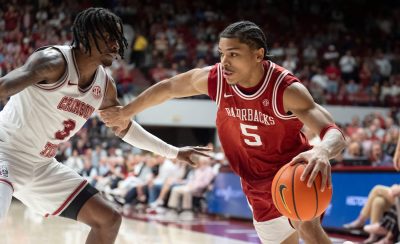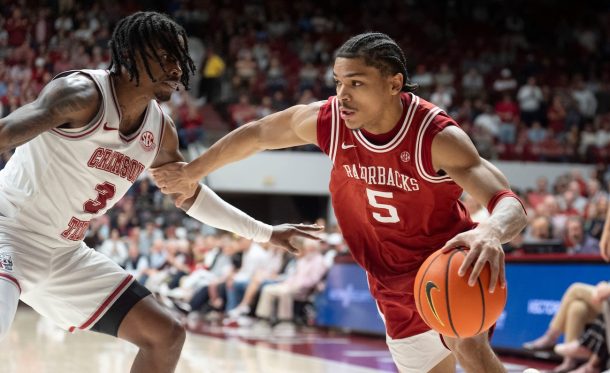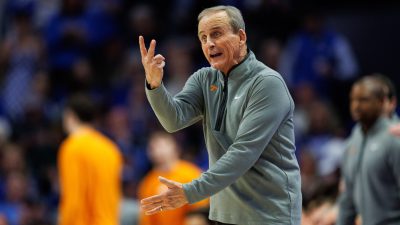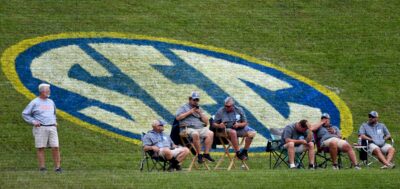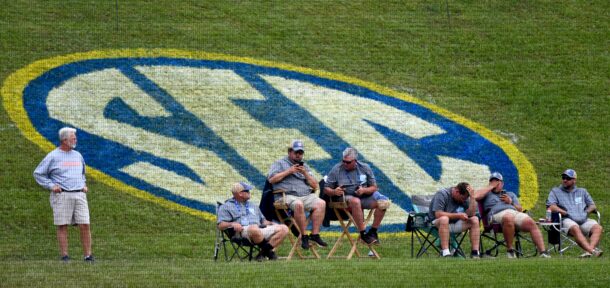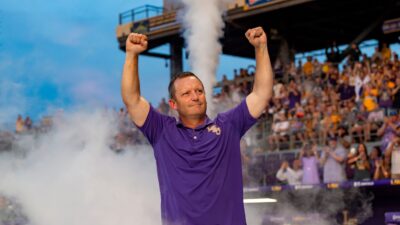Everything Kirby Smart said from the podium at 2025 SEC Media Days
By Paul Harvey
Published:
Georgia head coach Kirby Smart took his turn at the podium for SEC Media Days, addressing the media on Tuesday to preview the entire 2025 season.
Across his time, Smart touched on what will be a young team for the Bulldogs, which is a stark contrast from what the head coach is used to in Athens. He also touched on the expectations for quarterback Gunner Stockton and a chance for Georgia to host Alabama in Athens this fall.
Here’s everything he said from the podium in Atlanta:
KIRBY SMART: I appreciate Greg, what he does. He’s got a really tough, demanding job, especially in these times, and he leads from the front. I appreciate people who are willing to lead from the front in difficult times.
Thanks, Greg, for that warm welcome.
Next, and first and foremost, would be my wife. Absolutely the best teammate anybody could ever ask for. 19 years we’ve been together, and this is the 19th anniversary, and here I am celebrating it in Atlanta with you guys and she’s in Mississippi with our youngest son with a baseball tournament.
In the coaching profession you learn a lot of ways to celebrate things in different ways, and she and I have learned to appreciate the time we do have together. She spent a season with me at the Dolphins in the NFL, nine at Alabama, nine at Georgia, so there you go, nine and nine is 18, plus one is 19, getting ready to go into our 10th season at UGA and she’s been the best teammate I could ever ask for.
10th season at UGA. I want to say a couple words about somebody that is kind of stepping down from our program, and he’s been one of the biggest parts. People do not give athletic trainers enough credit. But for 30 years, the face of UGA athletic training, and in most cases the SEC athletic training, has been Dr. Ron Corson. He got his doctorate yesterday in athletic training, and I want to give a shout-out to Ron and all he’s meant to our program at University of Georgia and what all he’s done.
He is a selfless man that has given to multiple head coaches. He’s been basically the primary care physician for every coach and their family and every former player at UGA. So thank you for what you do, Dr. Ron, and what you continue to do for our program.
Real quick, three football players we brought today. I know everybody likes to talk about their guys. I’m going to brag on mine. C.J. Allen is a rising junior and one of the best leaders we’ve had in our program at linebacker. He is from Barnesville, Georgia, right down the road, and is a tremendous leader.
Quick story about C.J.: My son needed to get treatment for the last couple months, and he would come in the office every morning around 6:50, 6:55 to get treatment at 7:00 so he could make it to school by 8:00, and there wasn’t a morning that we got there that C.J. Allen was not already in the training room doing some kind of prehab, rehab, running, getting warmed up, taking care of injuries. He’s just a relentless worker and a relentless competitor, who got to play in some big games as a freshman, probably even before he was ready, and that’s paid off for us last year and this year with C.J.
Next would be Gunner Stockton from the great community of Raven county. He’s with us today. Gunner is a kid that leads from the front. Gunner is a winner. He comes from an athletic family background, his dad played at Georgia Southern, and he’s the kind of kid you want at the front of the line, and he leads from the front. So I appreciate what Gunner does. He’s going to be a big part of our program this year in leadership and doing that with the offensive players. He’s already begun to do that in his leadership groups that he runs right now.
The last one is Daylen Everette. Daylen is a senior. Daylen will graduate this next summer. Gunner just graduated this summer, and C.J. — I’m sorry. Daylen will graduate this fall, and C.J. Allen will graduate next summer being a third-year player.
Daylen is from Norfolk, Virginia. Daylen has been part of our program for four years, really a two-year starter in my mind. Had a big year for us last year. He gives tremendous confidence to a secondary that’s going to be young next year. Daylen is a kid that ever since we met him, no challenge is too big. He loves to practice. He loves to compete. He demands excellence, and he is here representing us today. I’m proud of Daylen.
Our team. Our team is going to be comprised of 54 percent first and second-year players. Very big change for us. I thought last year was probably one of the most veteran teams I’ve been a part of. You guys know the COVID class has kind of aged out, so we had multiple players that were in their fifth and sixth year last year, especially across the offensive and defensive lines. We had a tremendous group that all went out kind of at the same time, aged out at the same time, and so we’re going to be really young, especially on the offensive and defensive lines.
But 54 percent of our players are coming into their first or second year.
What do you get with that? You get youthful exuberance. We’ve had practices that have been spirited. We had a great spring practice that we talked about the words fire, passion and energy.
I think the biggest thing that separates college football teams today is complacency among players versus fire, passion and energy among players. So we’ve tried to highlight those traits as much as possible with our players.
Our players need to bring juice and energy each and every day. If they don’t, they’ll be confronted by the players that do. And if the players continue to do that, we’ll have a successful season and a successful football team.
In a day and age that, I think Sankey referenced it yesterday, times are changing. College athletics and college football is not broken. He used the word strained. I would say that it’s in a time of change and influx, that you have to navigate better than your opponent. You have to navigate better than your competitor, whether that’s conference to conference or within your own conference.
We continue to find ways to do that at the University of Georgia. We sell relationships over transactions. We think the relationship still wins out because the relationship allows you to push people and demand excellence, and we’re going to continue to do that at Georgia.
We don’t believe in just being transactional because when you’re transactional, you cannot accomplish whatever your ultimate goal is, whatever your greatest reach is. Whatever the ceiling is for every player and every team we have, you don’t reach that without relationships. So we’re going to try to win 24-hour increments each and every day to make sure we still attain that.
Great example of what I think about in college athletics, I wanted to share, Leland in our sports information department has a young lady that just won a National Championship with our track team. Kaila is with us today. Kaila Jackson is from Detroit, Michigan, came all the way to Athens, Georgia, to run track. She won a National Championship with our women’s track program, and she is kind of interning, kind of mirroring us in SID today, and that wouldn’t be possible without college athletics. I don’t think enough of those stories are told, and that is important to me.
I’m a traditionalist. I believe in the college athletic background and what it does for people, what it did for me and my family, what it did for my wife, being a female athlete at University of Georgia and playing basketball. That experience paves the way for future success, and I believe in that.
With that, I’m going to open it up in honor of the great Bob Holt, we’ll call it the Bob Holt question because he used to have the first one every time.
RELATED: Don’t miss the rest of SEC Media Days coverage. Grab a FuboTV free trial to be able to tune into the SEC Network.
Q. You’ve continually been outspoken about walk-ons and their intrinsic value to your program. What is your message to the players that may not have those same opportunities that your previous walk-ons had with the new roster limits?
KIRBY SMART: Well, that’s a great first question because I don’t want to jump on a soapbox and tell you how I really, really, really feel. Opportunities are being lost all across college athletics. Unfortunately, that’s part of it.
I can’t really give a message to the next walk-on because I don’t know that there’s going to be an opportunity for that walk-on.
I think find value in what people want. We still really preach fire, passion and energy, so we want kids who love the game. We found it’s not how fast you run the 40 or how talented you are, it’s how fast you run the 40th 40 and how passionate you are in the third and fourth quarter when you’re tired.
Sometimes those guys have more intrinsic value for your team than maybe a guy who is a scholarship player but is disinterested because he’s not playing. So a lot of those stories have been lost.
But I think you can reward those by going out and finding kids to fit in your 105. Doesn’t matter whether you call them a walk-on or just a scholarship player that may not get as much NIL that play with fire, passion and energy.
I’m looking forward to continuing that long kind of history we have of doing that by finding the right kind of players to come play at Georgia who love the university, who want to get a degree from there, and who want to be great football players.
But that’s a story that’s kind of untold, and I think it’s really untold in terms of other sports, Olympic sports, let’s call them, across college athletics.
Q. You beat Texas twice last year; now you get them at home. Do you have any special secret to beating Sark, and any insights from your days at Alabama that work well toward that end?
KIRBY SMART: No. I think if you’re going to beat a good football team, you’ve got to be a sound football team yourself. I didn’t overlap with Sark that I remember at Alabama, so we weren’t there at the same time.
Tremendous respect for him and his program, the job they do. To beat good teams, you’ve got to be a good team. We had a good football team last year. So did they. It’s not about us as coaches. It’s really about the players and what you believe in.
We got a lot of really good football teams to play next year besides just Texas, so we’re preparing for all of them.
Q. Coach, I know during the off-season you’ve talked about building depth. You were at Alabama nine years. You and Coach Saban built a lot of depth in the program. You’ve done that during the majority of your 10 years at Georgia. How have you changed within your organization to try to speed up somebody’s development when you get to develop depth with the impact of the transfer portal and NIL?
KIRBY SMART: Yeah, first of all, you don’t speed up development. That’s a misnomer. If you want to speed up development, then you’re probably looking for shortcuts that don’t exist. You want to develop somebody, it takes time. It takes reps. We can’t replicate reps faster. We can’t speed up a guy’s transition.
The transition it takes to become a good football player is different for every kid, and I’ve been fortunate for the last 19 years of college football to learn that and learn that it takes what it takes, and it takes time to grow those players.
Now, I wish I could speed it up. I really wish I could speed it up this year. But there’s no remedy or magic potion or we’re going to go get this guy out of the portal or that guy out of the portal. It’s all about continuity and what you’re doing with each team.
You’re seeing that across college football where there’s beginning to be a little bit more parity, I think, and it’s probably going to continue to go that way, so who does the best with what they have, which is what I enjoy about the game.
Q. Gunner’s relief appearance against Texas, how did that benefit the locker room the way he came in for Carson, and how does that serve as a teaching tool for young players who may not be starting?
KIRBY SMART: Yeah, I don’t know that the benefit in the locker room is as great as the other parts you just said. What does it teach a young player that’s sitting in the wings that you just don’t ever know when your number is going to be called. The one thing that I really appreciate about Gunner and most quarterbacks is he prepared every game as if he was the starter.
People can say that and say that’s coach-speak, but he actually did it. He went in, watched extra tape, and he knew that at any point in time, he could be called up to go into the game and play, and he didn’t play in a normal environment where you’ve got a big lead, maybe you’re beating an opponent; he went in against a top defense in the country in one of the biggest games of the season and performed well, for a guy that had not gotten a lot of reps with the ones. So I thought he handled that moment well, and he taught a lot of our young players that you’ve got to be prepared and ready.
Q. You mentioned a little bit on character, football, personal character background and stuff, and everybody talks about the film evaluation side of things, and character, football stuff has always been important. It used to be a scholarship and cost-of-attendance check. Now we’re putting real percentages money-wise revenue on these kids’ heads. What are the cutting-edge things you guys are doing at Georgia to be ahead of that, be ahead of the curve in the character and personal development, bringing the right kids into your program?
KIRBY SMART: Yeah, I don’t know that I would say cutting edge. We’re all trying to do it better than anybody else. If I share that with you, then I’m sharing it with everybody. If we’re doing anything cutting edge, I’m not sharing it today; I can assure you of that.
What I do think is important or more important that you hit on is it’s less about what the tape looks like, okay. For instance, if we’re going to sign four corners or four DBs, there’s going to be a thousand DBs that are good enough on the tape. Let’s don’t talk about the DBs that are above the line. The line is are they good enough to play winning football at Georgia. There’s thousands. Let’s just get the ones that care, the ones that are not transactional, that are relationship built. They want relationships. They want to be coached. They want to be pushed.
Yeah, they’re going to get paid. No coach is going to stand up here and say they don’t want players to get paid. We want them to get paid. I’m completely comfortable with that. What I want is them to get paid and that not change how they go about their business, that not change if they’re sensitive to being demanded excellence of.
It’s so ironic to me that you meet a parent and they’re like, Coach, I really want my son to play where he’s pushed and demanded of and he gets coached each and every day the hard way because I honestly don’t think he can make it without that. We all needed it. I needed it at 17. A 17-year-old needs to be pushed. It doesn’t preclude them from gaining monetary value. They can do both those two things.
But a lot of coaches aren’t willing to do that. People don’t want to confront and demand anymore for fear of losing a player. I would rather go get the right player that buys into that and then I’ve got something special when they do develop and get all those reps.
Q. Your ’25 non-conference schedule is what it is, but going forward it’s pretty robust, including 2030 you’ve got Georgia Tech, Clemson and Ohio State. What’s the chances those games hold and then the scheduling philosophy you guys mapped out continues?
KIRBY SMART: Really no clue what the chances are. It’s one of those things that I can only speculate on. I love big out-of-conference games. I love opportunities to play teams on a big stage, to open with big games. Everybody talks about it. I think that’s where we’re headed. To have that kind of schedule where you get to play out of conference and you play other — the A4s. I love those kind of games because our kids get up for them.
I think the bigger decision is how many teams are going to be in the playoff, how we go about selecting those playoffs. You’re going to motivate more teams to play schedules like that with a fix in the way we go about selecting the teams.
Q. You keep talking about how fire, passion and energy are huge pillars of the Georgia football program, actually added pillars to the foundation. Can you name a few specific players that have exhibited it thus far, and why add it in this particular off-season?
KIRBY SMART: Well, it’s hard for me to pick one or two players. I actually want them to compete to separate themselves as guys that have fire, passion and energy. We’ve picked a few. I don’t really choose to share them publicly today because that could change as soon as tomorrow, who’s working out the hardest, who’s leading and who’s pushing. Why is it important to identify it now? Because the culture in college football is slowly changing.
You’ve got to remember I was part of a nine-year program and a nine-year run that was one of the greatest ever in college football and now I’m at a place that’s doing it right and competing at a really high level.
I’ve seen what it looks like to have fire, passion and energy, and I’ve seen guys that were really hungry, and I go back to Dont’a Hightower or Rolando McClain or Julio Jones or Trent Richardson or Mark Ingram, all the way to Roquan Smith to Nolan Smith to Jordan Davis to George Pickens to Jake Fromm to guys that played in our program, D’Andre Swift. You know what they had? They had a love for the game and fire, passion and energy.
That’s not the same as it used to be. You can say what you want, but there’s people more in college football today, especially in the SEC, that are comfortable with where they are. This is a pretty good life. I’m earning 200K a year. I’m very comfortable. You don’t reach your goals being comfortable. You don’t attain great success — none of those people I mentioned before were ever comfortable. They were aiming at something. They had a goal. They wanted to go achieve it.
What you see now is where’s the drive and energy and enthusiasm.
Well, we want people that have it. We’re going to seek it. We’re going to try to go find it. If we can just do that 1 percent better than everybody else, it gives us an opportunity to be ahead.
Q. Just curious, Texas has got a lot of attention during this season. You talked about how underclassmen heavy your program is. Do you sense a level of eagerness from the underclassmen to prove hey we can be just as good as the Georgia teams of the fact and quite frankly we beat Texas twice last year?
KIRBY SMART: Yeah, a lot of those kids didn’t. They weren’t the guys on the field. But yeah, I do sense in our practices, in our workouts and the things we’ve been able to be a part of in the spring, there is a youthful exuberance. That can be positive and negative. I can sit up here last year and tell you how experienced we were. We had all these guys coming back and they played a lot of football. But are they motivated and are they really wanting to be great as opposed to sometimes when it’s new there’s a lot more excitement. It’s their first time getting a chance to start. It’s their first time being a major player in the rotation.
There’s good and bad about both. We’ve got to manage that. We’ve got to be patient with them and we’ve got to get them better.
Q. How much have your practices changed or how much do you plan to modify them from the time of the back-to-back titles and Bloody Tuesdays now with longer seasons and now roster limitations in effect?
KIRBY SMART: Well, demands on how limited our roster is because we’re not all operating off of 105 right now. We have the ability because of the settlement to have some guys that were grandfathered in.
We will make changes and adaptations to how we do things based on our numbers, but right now I don’t know what those numbers are going to look like for fall camp and how many people we’re going to bring in.
The season ultimately we may have similar numbers to what we’ve had in past years. Eventually that’s going to go down to 105 and you’re going to have to change with each and every year, and I think you evolve as a coach. We’ve got to find more creative ways to get reps and grow players, and we all study NFL teams, the way they go about it. I just don’t know if that’s a perfect mirror because the kids we’re trying to develop need more reps than an NFL player.
First thing a general manager tells us when they come see us is don’t come to our league to develop. We can’t develop you. We don’t have the practices. If you actually want to get better at football where you can stay longer in the NFL, you have to go through the college regimen to grow and get better. They don’t need the practices that we need.
Q. The hot rumor yesterday was a second-hand rumor about Nick Saban possibly being interested in coming back to coaching. Lane Kiffin said he wouldn’t be surprised. I was wondering if you could share your reaction as well as your relationship with Nick Saban since he’s retired.
KIRBY SMART: Yeah, I called and offered him Muschamp’s job but he was overqualified, so he wasn’t interested.
No, I heard all the scuttlebutt and everything about it. I almost laughed. It was like somebody needed something interesting to talk about yesterday, so they chose to go to Coach Saban to do it.
The game is better with him involved, and he is involved. He is passionate about it. He and I still talk and share ideas from time to time about defensive philosophies and the way to do things, and he’s still watching tape and very, very involved in football. He loves it.
His brilliance, as brilliant as he is in many ways is around football. It’s around scheming. It’s around another way to do something to stay ahead of the offensive minds, and I think that’s one of the elite talents he has, and he still loves that. He’s still passionate about that.
But make no mistake about it. The boss at home is going to make that call for him, not him.
Q. John McDaid talked just before you did about all the rule changes in the game —
KIRBY SMART: Did y’all love that? Everybody loves McDaid’s talk, man.
Q. I’m curious what your take on some of those rules are but specifically about the abrupt movement on defense, and people can contend that that was one of the reasons that you probably beat Texas was drew them offsides with your defense last season. Curious about all the rules but specifically the abrupt movement on defense, how that impacts your team.
KIRBY SMART: Yeah, you would need to define abrupt for me because we could talk for hours about what’s abrupt and what’s not. Was that movement abrupt or was that slow, you sitting down? You’ve got to define abrupt. He’s got to define abrupt, and he’s got to teach his guys that go out on the field, and I think they do a tremendous job of tape study and how to go about that.
It’s one of those things that is very intricate among football and in football minds, and people try to manipulate and do things and change things. The game is ever evolving, so I think John McDaid and his staff do a tremendous job navigating that.
Q. You mentioned a young secondary a couple minutes ago. One position I wanted to ask you about was the strong safety. You have some young talented freshmen but you also have some familiar names on the roster. Give us some insight on how the position is heading into fall camp?
KIRBY SMART: Yeah, we’ve got great competition there. KJ Bolden played a lot of snaps last year. He’s coming back. We need him to be a leader. We need him to help set the tone for how to go about things. We’ve got some older players there that are going to be in competition, and we’ve got a couple transfers in.
We do things a lot of times defensively by committee. We play a lot of players. I think we had third or fourth most players over 100 snaps. So if you come to Georgia, you expect to play, we want to give you an opportunity to play, so we get a lot of those guys reps and grow them and we’ll see where we are in fall camp at that position.
Q. The last time that Alabama played Georgia in Athens you were a defensive coordinator for the Crimson Tide. What are your thoughts on that game? Last year’s game was great. What are your thoughts on hosting Alabama this season?
KIRBY SMART: It’s a great atmosphere, just like we went into last year to play them, a night game on the road. They’ll come to our place and play. A tremendous atmosphere. I know a lot of people from Tuscaloosa are coming over to the game. Athens, the city of, loves it. We bring a great environment.
It’s what college football is about. This game is about playing great match-ups like that. It’s what the fan bases want. It’s what the nation wants. It’s what college football needs. It’s what college football and the SEC is about. Georgia and Alabama at home, at our place, I wish it could happen more often. Seems like we’ve played over there three or four times since they’ve come to see us and play. So it’s a great opportunity, and I look forward to it.
Paul Harvey lives in Atlanta and covers SEC football.


